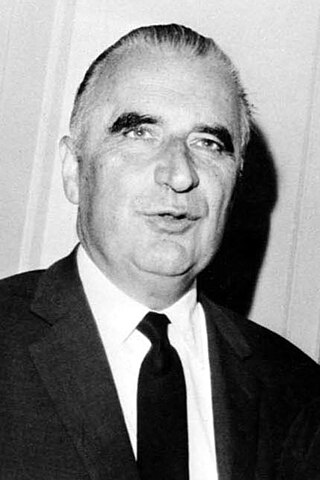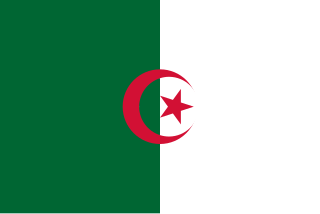
The History of Algeria from 1962 to 1999 includes the period starting with preparations for independence and the aftermath of the independence war with France in the 1960s to the Civil War and the 1999 presidential election.

The president of the People's Democratic Republic of Algeria is the head of state and chief executive of Algeria, as well as the commander-in-chief of the Algerian People's National Armed Forces.

The Democratic National Rally is a political party in Algeria. The party held its Second Congress on 15–17 May 2003.

The Movement of Society for Peace, sometimes known by its shortened form Hamas, is a Sunni Islamist party in Algeria, led by Mahfoud Nahnah until his death in 2003. Its current leader is Abderrazak Makri. It is an offshoot of the Muslim Brotherhood.

The Islamic Salvation Front was an Islamist political party in Algeria. The party had two major leaders representing its two bases of its support; Abbassi Madani appealed to pious small businessmen, and Ali Belhadj appealed to the angry, often unemployed youth of Algeria.

The National Liberation Front, commonly known by its French acronym FLN, is a nationalist political party in Algeria. It was the principal nationalist movement during the Algerian War and the sole legal and ruling political party of the Algerian state until other parties were legalised in 1989.

The Algerian Civil War, known in Algeria as the Black Decade, was a civil war fought between the Algerian government and various Islamist rebel groups from 11 January 1992 to 8 February 2002. The war began slowly, as it initially appeared the government had successfully crushed the Islamist movement, but armed groups emerged to declare jihad and by 1994, violence had reached such a level that it appeared the government might not be able to withstand it. By 1996–97, it had become clear that the Islamist resistance had lost its popular support, although fighting continued for several years after.

Parliamentary elections were held in Algeria on 5 June 1997. The result was a victory for the National Rally for Democracy (RND), a new party created in early 1997 for President Zéroual's supporters, which won 156 out of 380 seats. They were followed by the Movement of Society for Peace with 69 seats, the National Liberation Front (62), and the Islamist Islamic Renaissance Movement (34). The two Berberist parties, FFS and RCD, got 20 and 19 seats respectively. Views on this election were mixed; most major opposition parties filed complaints, and the success of the extremely new RND raised eyebrows. The RND, FLN, and MSP formed a coalition government, with the RND's Ahmed Ouyahia as prime minister.

The People's National Assembly is the lower house of the Algerian Parliament. It is composed of 407 members directly elected by the population. Of the 407 seats, 8 are reserved for Algerians living abroad. Members of the People's National Assembly are directly elected through proportional representation in multiple-member districts and serve terms lasting five years at a time. The last election for this body was held on 12 June 2021. The minimum age for election to the Assembly is 28.

Legislative elections were held in France on 18 November and 25 November 1962 to elect the second National Assembly of the Fifth Republic.
El Moudjahid is an Algerian French-language newspaper. It was founded during the Algerian War to inform FLN resistance fighters, and after independence it became the newspaper of the single-party FLN government. Since the FLN was voted out of power in 1991, the newspaper is no longer affiliated with that party.

Parliamentary elections were held in Algeria on 17 May 2007. 24 political parties and around 100 independent lists with a total of more than 12,000 candidates competed for the 389 seats in the National People's Assembly. While most Algerians voted on May 17, immigrants from Algeria to other countries and Algerians living in the Sahara and other nomads and semi-nomads voted on May 16 due to the distance from Algiers, the country's capital.

The Provisional Government of the Algerian Republic was the government-in-exile of the Algerian National Liberation Front (FLN) during the latter part of the Algerian War of Independence (1954–1962).

Parliamentary elections were held in Algeria on 30 May 2002 to elect members of the People's National Assembly. The governing National Liberation Front (FLN) won a majority of seats in the election. The election suffered from a low turnout, violence and boycotts by some opposition parties.

A constitutional referendum was held in Algeria on 23 February 1989. Coming after the 1988 October Riots, the new constitution removed references to socialism and allowed for multi-party democracy. Despite calls for a boycott by radical Islamists and opposition from trade unions and FLN members, the amendments were approved by 73% of voters with a 79% turnout. Local elections were scheduled for the following year, with parliamentary elections to be held in 1991.

Parliamentary elections were held in Algeria on 26 February 1987. The country was a one-party state at the time, with the National Liberation Front (FLN) as the sole legal party. The FLN nominated 885 candidates for the 295 seats, with voters asked to express their preference by crossing out names on the ballot. Only 67 of the 132 incumbents who ran for re-election were successful.

Parliamentary elections were held in Algeria on 20 September 1964. The country was a one-party state at the time, with the National Liberation Front (FLN) as the sole legal party. The FLN submitted a single list of 138 candidates for the 138 seats, of whom 72 were incumbent members of parliament. Voter turnout was 85%.

Parliamentary elections were held in Algeria on 10 May 2012. The incumbent coalition, consisting of the National Liberation Front (FLN) of President Abdelaziz Bouteflika and the National Rally for Democracy (RND) of Prime Minister Ahmed Ouyahia, held on to power after winning a majority of seats. The Islamist parties of the Green Algeria Alliance lost seats.

The Algerian Movement for Justice and Development is a political party in Algeria.

Snap parliamentary elections were held in Algeria on 12 June 2021 to elect all 407 members of the People's National Assembly. Initially expected to be held 2022, the elections were brought forward following a constitutional amendment approved in a referendum in November 2020.












